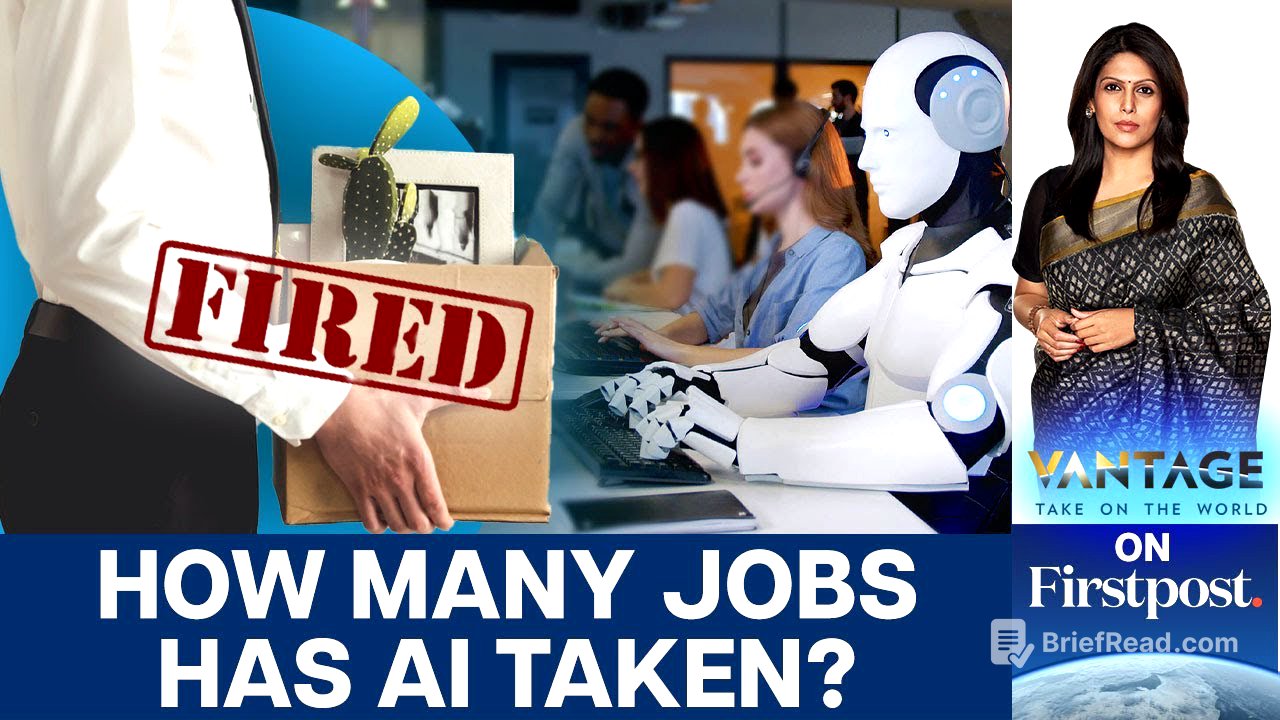TLDR;
The video discusses the impact of artificial intelligence (AI) on the job market, highlighting both the potential for job displacement and the creation of new roles. It presents statistics on job losses across various sectors and countries due to AI adoption, while also noting instances where AI implementation has faced limitations or led to unexpected outcomes. The video emphasizes the need for proactive measures in retraining, regulation, and reimagining work to mitigate the negative consequences of AI-driven job displacement.
- AI is predicted to displace a significant number of entry-level white-collar jobs, potentially leading to increased unemployment.
- While AI has led to job losses in sectors like customer service, IT, and logistics, it has also created new jobs requiring different skills.
- Women's jobs are disproportionately at risk due to the automation of female-dominated fields.
- The video stresses the urgency for retraining, regulation, and reimagining work to address the challenges posed by AI-driven job displacement.
Introduction: AI and the Job Market [0:04]
The video addresses the growing concern that artificial intelligence (AI) will replace human workers, particularly in entry-level white-collar jobs. Anthropic CEO Dario Amui predicts that AI could eliminate up to 50% of these positions, potentially causing unemployment to rise to levels unseen since the Great Depression. The video questions the value of traditional career paths if AI can easily replace human workers, acknowledging the bleak outlook but also questioning the extent of AI's current impact on the job market.
Current Impact of AI on Employment [1:20]
Globally, 14% of workers have been affected by AI, leading to displacement or career changes, which equates to approximately 375 million workers. While not all of these workers lost their jobs, estimates suggest that around four to five million jobs have been lost due to AI. In the United States, 1.9 million jobs were lost directly due to AI adoption, while China saw 1.2 million job losses in logistics and basic manufacturing. India experienced 650,000 IT service job losses, contributing to the overall global figure of around five million jobs lost to AI.
Sectors Most Affected by AI [2:23]
Customer service and call centers have been significantly impacted by AI-powered chatbots and virtual assistants, resulting in 1.2 million job losses globally. IT services and tech support have seen around 850,000 job losses as AI handles basic troubleshooting, software testing, and back-end tasks. Warehousing and logistics have experienced 1.1 million job cuts due to AI-driven robots automating sorting, packing, and inventory management. Administrative and clerical jobs have been reduced by approximately 750,000 as AI tools handle data entry, invoice processing, and reporting. Banking and financial services have seen around 400,000 job cuts, while retail and e-commerce have experienced 300,000 job losses due to AI's role in inventory management, cashierless stores, and customer analytics.
Disproportionate Impact on Women [3:56]
A United Nations study indicates that women's jobs are more at risk from AI, with 41% of women's jobs exposed compared to 28% for men. This disparity is attributed to the fact that many female-dominated fields, such as administrative support and customer service, are easier to automate.
Limitations and Unexpected Outcomes of AI Implementation [4:17]
Despite the trend of AI replacing jobs, some companies have faced limitations and unexpected outcomes. Clara, a buy now pay later company, aimed to replace people with AI but realized by 2025 that AI has its limits. IBM, which predicted replacing 8,000 jobs with AI in 2023, has only managed to replace a few hundred so far. AI has also created new jobs, offering some hope amidst the bleak outlook.
Future Projections and the Need for Action [4:59]
By 2026, AI could displace 75 million jobs while simultaneously creating 133 million jobs that require entirely different skills. The video suggests that those who are already educated and connected are more likely to secure these new jobs, potentially leaving the working class behind. The video emphasizes the need for retraining, regulation, and reimagining work to mitigate the negative consequences of AI-driven job displacement, warning that failure to act will result in a future that is "artificially human."
Firstpost Availability in Multiple Languages [6:31]
Firstpost is now available in nine languages on YouTube, including English, French, German, Hindi, Indonesian, Italian, Japanese, Portuguese, and Spanish. Viewers can select their preferred language by going to settings and clicking on the audio track option.

![[LIVE] Kajian Muslimah: Tipe Perempuan dalam Al-Qur'an - Ustadz Adi Hidayat](https://wm-img.halpindev.com/p-briefread_c-10_b-10/urlb/aHR0cDovL2ltZy55b3V0dWJlLmNvbS92aS9JMDJzY0k0Y0l3WS9ocWRlZmF1bHQuanBn.jpg)







